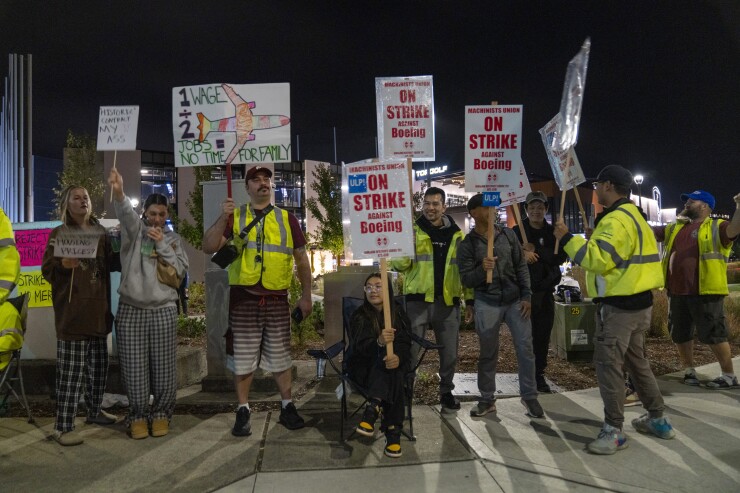Boeing factory workers walked off the job for the first time in 16 years, halting manufacturing across the planemaker's Seattle hub after members of its largest union
Members of the International Association of Machinists and Aerospace Workers, which represents 33,000 Boeing employees across the U.S. West Coast,
Boeing's shares fell 2.2% at 9:38 a.m. in New York on Friday. The stock has declined about 38% this year amid a crisis triggered by a midair 737 panel blowout in early January.
Machinists voted 94.6% to reject Boeing's offer and 96% supported a strike. While both parties have expressed a desire to get back to the bargaining table, the move adds to the strain on Boeing. The company was
Read more:
"This has been a long time coming, our members spoke loud and clear tonight,"
Seattle, the historical home of Boeing, remains its largest manufacturing hub. In addition to 737s, the company makes 777 and 767 models at its Everett facility to the city's north. A strike risks disrupting production at the factories as well as the wider supplier network, leaving a finely-tuned manufacturing system out of step and creating more so-called traveled work that's been at the heart of Boeing's recent production woes.
At the same time "the strike could be a good opportunity for Boeing to reset, and either pause supplier deliveries or take them down to a more realistic level," Rob Stallard, an analyst at Vertical Research Partners, said in a note ahead of the strike vote. "Boeing's 737 supply chain is all over the map when it comes to delivery rates."
Holden added that Boeing's offer didn't compensate for 16 years of stagnated wages, higher out-of-pocket health care costs and the relocation of thousands of union jobs. "There's a lot at stake here for our members, so I am proud of them," he said. "And we're going to get back to the table as quickly as we can."
Read more:
Boeing said in a statement that it remains "committed to resetting our relationship with our employees and the union, and we are ready to get back to the table to reach a new agreement."
Shortly after midnight on Friday, workers descended on the Renton factory with placards covering every entrance. They shouted noisily as drivers passing by honked their horns in support.
"It's been an amazing experience to be a part of this and all the camaraderie," said Chris Solis, 19, who just celebrated his one-year anniversary at Boeing and was getting his first taste of a strike. "We've heard all sorts of things from different people, but the way that the company is acting just doesn't seem very fair."
By striking, members ignored a plea for peace by new Boeing CEO Kelly Ortberg, who has vowed to reset labor relations. And they bucked the recommendation of their own union leaders that they accept terms that included a 25% guaranteed wage increase over four years. While that's the largest such pay hike ever offered by the planemaker, workers had expected a far greater increase. They were also angered that the terms eliminated an annual bonus.
Boeing has been in a financially difficult situation since the Jan. 5 accident exposed deficiencies at its factories and forced the planemaker to reduce production. The company has been bleeding cash as a result, and its credit rating is hovering one step above speculative grade as it contends with a heavy debt load of $45 billion.
Read more:
The defeat at the hand of workers means that Boeing and IAM District 751 will need to head back to the negotiating table to try to find terms that satisfy members of a union with a long history of activism. Cai von Rumohr, an analyst at TD Cowen, has estimated a 50-day walkout, in line with previous strikes, would clip between $3 billion and $3.5 billion from Boeing's cash flow.
Boeing workers have vowed to picket at about 30 company sites from California to Moses Lake in eastern Washington. Because the union is claiming an unfair labor practices strike, a mediator will be assigned by the federal National Labor Relations Board, Holden said.
Boeing said earlier its offer was the best it could put forward given its strained finances. Managers have been canvassing other workers this week to see if they have the skills to temporarily replace striking IAM members.
IAM members outside of Boeing's Renton factory have voiced their anger at the offer and described the frustration of seeing wages stagnate under a long-term deal struck in 2014 that also eliminated pensions.
They're also mad the company kept a provision that forces hourly workers to be on the job for six years before they reach the maximum pay categories.
Ortberg's warning that a strike wouldn't end well for anyone felt like a threat, especially for workers trying to get better pay to support their families, said Solis, the Renton worker, who was there with two friends.
"We're fresh out of high school, making decent wages," Solis said. "But there's people here raising families. And in this economy, living in Washington state with the expenses, it's just not fair."






